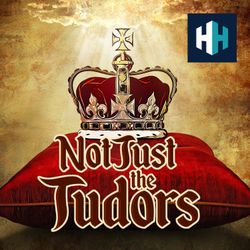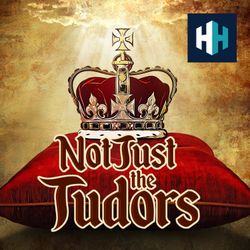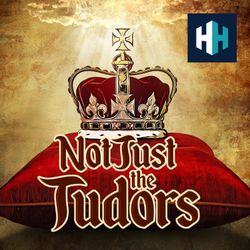Share

Not Just the Tudors
Elizabethan 'Travel Liar': The Truth about David Ingram
In 1567, a sailor named David Ingram sailed from Plymouth with 400 others on a slaving expedition. The ensuing events read like a fantastic adventure story: shipwrecked in a hurricane off Mexico, a battle with - and imprisonment by - the Spanish, escape and a 3000 mile trek to Canada. Ingram was one of only three who survived to tell the tale. And what a tale he told.
For four centuries, it has been thought that Ingram may have made it all up. But in this edition of Not Just the Tudors, Professor Suzannah Lipscomb finds out from Professor Dean Snow, the truth about the extraordinary journey of David Ingram.
This episode was edited by Joseph Knight and produced by Rob Weinberg.
Discover the past on History Hit with ad-free original podcasts and documentaries released weekly presented by world renowned historians including Dan Snow, Suzannah Lipscomb, Lucy Worsley, Matt Lewis, Tristan Hughes and more. Get 50% off your first 3 months with code TUDORS. Download the app on your smart TV or in the app store or sign up here >
You can take part in our listener survey here.
For more Not Just The Tudors content, subscribe to our Tudor Tuesday newsletter here.
More episodes
View all episodes

508. When Elves & Fairies Lived Among Us
42:51||Ep. 508In the mist‑shrouded Highlands, a quiet minister dared to trespass into forbidden realms. Convinced that fairies were not mere fables but a hidden nation with laws and lives of their own, Robert Kirk set out to reveal their secrets, and paid a terrible price. When Kirk died suddenly in 1692, locals whispered he had not died at all, but been taken alive into the Fairy Commonwealth for his betrayal.Professor Suzannah Lipscomb and historian Rachel Morris journey into Kirk’s haunted world, an age when science and sorcery, angels and spirits, coexisted in a twilight of wonder and fear.MORE:Elizabeth I's Conjuror: John DeeListen on AppleListen on SpotifyJohn Dee's AngelsListen on AppleListen on SpotifyPresented by Professor Suzannah Lipscomb. The researcher is Max Wintle, audio editor is Tim Arstall and the producer is Rob Weinberg. The senior producer is Anne-Marie Luff.All music courtesy of Epidemic Sounds.Not Just the Tudors is a History Hit podcastSign up to History Hit for hundreds of hours of original documentaries, with a new release every week. Sign up at https://www.historyhit.com/subscribe.
507. Queen Mary II & the Glorious Revolution
53:50||Ep. 507What does it take to rule as an equal in a man's world? How did a quiet, devout queen help reshape Britain’s monarchy forever?All this month, Professor Suzannah Lipscomb is exploring the Restoration monarchs. In this episode, she focuses on Queen Mary II, England’s first and only joint sovereign, who ruled alongside her husband William of Orange. Far from being a passive partner, Mary was politically astute, deeply devout, and a formidable cultural influence, playing a pivotal role in forging Britain’s constitutional monarchy. Dr Holly Marsden joins Suzannah to examine Mary II’s reign and why her story still resonates in the histories of Britain, gender, and political revolution.MORE:William III & the Persecution of SodomitesListen on AppleListen on SpotifyThe Massacre of GlencoeListen on AppleListen on SpotifyPresented by Professor Suzannah Lipscomb. The researcher is Max Wintle, audio editor is Amy Haddow and the producer is Rob Weinberg. The senior producer is Anne-Marie Luff.All music courtesy of Epidemic Sounds.Not Just the Tudors is a History Hit podcastSign up to History Hit for hundreds of hours of original documentaries, with a new release every week. Sign up at https://www.historyhit.com/subscribe.
506. Tudor True Crime: Lynching of the "Duke's Devil"
58:28||Ep. 506This episode contains discussions of sexual assault, violence and child abuse. Listener discretion is advised. How did the mob lynching of a notorious astrologer and occultist in June 1628 act as a grim prelude to the demise of King Charles I? Why did John Lambe - accused of witchcraft, sorcery, and moral corruption - become the target for popular anger at a monarchy seen as distant, corrupt, and unaccountable?Professor Suzannah Lipscomb is joined by Professor Alastair Bellany to uncover how witchcraft accusations became political weapons, and how the killing of one man revealed a terrifying truth: royal authority in England was beginning to fail.MORE:Tudor True Crime: Murder in the Stuart CourtListen on AppleListen on SpotifyGiordano Bruno: Mystic, Heretic, SpyListen on AppleListen on SpotifyPresented by Professor Suzannah Lipscomb. The researcher is Max Wintle, audio editor is Amy Haddow and the producer is Rob Weinberg. The senior producer is Anne-Marie Luff.All music courtesy of Epidemic Sounds.Not Just the Tudors is a History Hit podcastSign up to History Hit for hundreds of hours of original documentaries, with a new release every week and ad-free podcasts. Sign up at https://www.historyhit.com/subscribe.
505. James II: The Restoration's Last Catholic King
52:28||Ep. 505A king with unyielding faith. A nation on the brink. A crown lost to revolution.King James II is often dismissed as the unfortunate monarch swept aside by William and Mary. But behind the Glorious Revolution lies a story of ambition, devotion, and downfall more dramatic than legend would suggest.Professor Suzannah Lipscomb joins Dr. Breeze Barrington to uncover the man behind the myth. Was James a tyrant blinded by belief, or a visionary undone by his own time?MORE:The Restoration Queen: Maria of ModenaListen on AppleListen on SpotifyDiary of Samuel PepysListen on AppleListen on SpotifyPresented by Professor Suzannah Lipscomb. The researcher is Max Wintle. Edited and produced by Rob Weinberg. The senior producer is Anne-Marie Luff.All music courtesy of Epidemic Sounds.Not Just the Tudors is a History Hit podcastSign up to History Hit for hundreds of hours of original documentaries, with a new release every week. Sign up at https://www.historyhit.com/subscribe
504. Katherine Howard's Deadly Affairs
55:22||Ep. 504Was Henry VIII's fifth wife a promiscuous teenager and then heartless adulteress and schemer? Celebrated, scrutinised, and endlessly talked about at court, Katherine Howard’s reign was dazzlingly brief; within two years of marrying the king, she was accused of adultery and treason and executed.Professor Suzannah Lipscomb is joined by Gareth Russell and Dr Nicola Clark to get to know the real young woman who was plucked from obscurity, whose life was cut short by the unforgiving power politics of Tudor England.MORE:Anne Boleyn’s Final YearListen on AppleListen on SpotifyAnne Boleyn & Katherine Howard's Uncle, Thomas HowardListen on AppleListen on SpotifyPresented by Professor Suzannah Lipscomb. Edited and produced by Rob Weinberg. The senior producer is Anne-Marie Luff.All music courtesy of Epidemic Sounds.Not Just the Tudors is a History Hit podcastSign up to History Hit for hundreds of hours of original documentaries, with a new release every week. Sign up at https://www.historyhit.com/subscribe.
503. Charles II: Restoration of the Monarchy
56:56||Ep. 503From clinging to a tree while evading capture, his face blackened with soot, to triumphantly sailing home to reclaim his crown — the story of Charles II is one of survival, spectacle, and transformation. Professor Suzannah Lipscomb guides us through the Restoration, tracing life in England from the shadow of civil war to the glittering courts of Restoration London, and discovers how intrigue, scandal, plague, and fire gave rise to an age of theatre, science, and unfettered pleasure. MORE:Nell Gwyn: Actress and Royal MistressListen on AppleListen on SpotifyIsaac Newton: The Man at the Centre of GravityListen on AppleListen on SpotifyPresented by Professor Suzannah Lipscomb. Edited and produced by Rob Weinberg. The senior producer is Anne-Marie Luff.All music courtesy of Epidemic Sounds.Not Just the Tudors is a History Hit podcastSign up to History Hit for hundreds of hours of original documentaries, with a new release every week. Sign up at https://www.historyhit.com/subscribe.
502. Why Cromwell's Republic Failed
01:10:04||Ep. 502After the execution of King Charles I, England became a Republic for the only time in its history. Yet why was this revolutionary moment so short-lived? Why did Oliver Cromwell’s Commonwealth collapse?Professor Suzannah Lipscomb explores its rise and demise with a panel of expert historians: Professor Ronald Hutton, Dr. Jonathan Healey and Dr. Miranda Malins. Together they discuss what the Republic's failure reveals about authority, popular consent, and the enduring pull of monarchy in 17th-century Britain.MORE:The English Civil WarListen on AppleListen on SpotifyOliver Cromwell v. Charles IListen on AppleListen on SpotifyPresented by Professor Suzannah Lipscomb. The researcher is Max Wintle, audio editor is Amy Haddow and the producers are Fiona Turnock and Rob Weinberg. The senior producer is Anne-Marie Luff.All music courtesy of Epidemic Sounds.Not Just the Tudors is a History Hit podcastSign up to History Hit for hundreds of hours of original documentaries, with a new release every week. Sign up at https://www.historyhit.com/subscribe
501. "Bloody Mary": Debunking the Myths
52:38||Ep. 501Was Mary Tudor truly “Bloody Mary”? Has England’s first reigning queen been misunderstood for centuries? Determined to restore Roman Catholicism, her reign became forever associated with the burning of Protestants. But was she really a religious tyrant, or a trailblazer trapped by Europe's violent politics?Professor Suzannah Lipscomb is joined by Professor Anna Whitelock to put the record straight on the remarkable reign of Mary I, five turbulent years which shaped the future of England in profound, and often misrepresented, ways.MORE:Mary I: What if She'd Lived?Listen on AppleListen on SpotifyThe Spanish King of EnglandListen on AppleListen on SpotifyPresented by Professor Suzannah Lipscomb. The researcher is Max Wintle, audio editor is Amy Haddow and the producer is Rob Weinberg. The senior producer is Anne-Marie Luff.All music courtesy of Epidemic Sounds.Not Just the Tudors is a History Hit podcastSign up to History Hit for hundreds of hours of original documentaries, with a new release every week. Sign up at https://www.historyhit.com/subscribe.
500. Ireland Under the Brutal Tudors
46:36||Ep. 500What impact did the Tudors have on Ireland, not just in the councils of kings and earls, but in the rhythms of ordinary life? What were the consequences for ordinary citizens when English power was asserted through martial law, low-level coercion and the constant threat of punishment?Professor Suzannah Lipscomb is joined by Dr David Edwards to discuss how communities were reshaped from the ground up.MORE:Ireland's Witchcraft TrialsListen on AppleListen on SpotifyTudor Conquest of IrelandListen on AppleListen on SpotifyPresented by Professor Suzannah Lipscomb. The researcher is Max Wintle, audio editor is Amy Haddow and the producer is Rob Weinberg. The senior producer is Anne-Marie Luff.All music courtesy of Epidemic Sounds.Not Just the Tudors is a History Hit podcastSign up to History Hit for hundreds of hours of original documentaries, with a new release every week. Sign up at https://www.historyhit.com/subscribe.